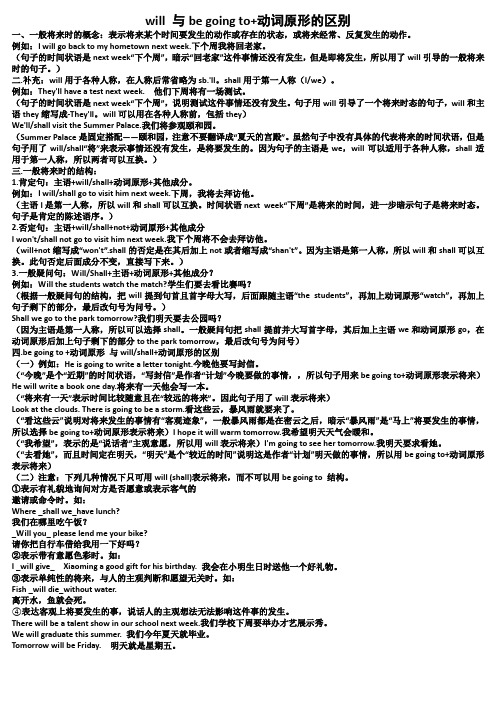be going to和will的区别
will和be going to的区别

will 和 be going to
4.在有条件从句的主句中,一般不用 be going to, 而多用will。
If the rain stops, the match will begin. 如果雨停了,比赛就会开始了。 If you have any difficulties, I will help you. 如果你有任何困难,我会帮助你。
will 和 be going to
2. be going to 表示根据主观判断将来肯定发生 的事情,will表示客观上将来势必发生的事情。 He is seriously ill. He is going to die. 他病得很严重,马上就要死了。 He will be twenty years old. 他马上就要20岁了。
will 和 be going to
will 和 be going to都可以用来表示将来,但 是用法有区近期、眼下就要发生的事情, will 表示的将来时间则较远一些。 He is going to write a letter tonight. 他今晚将要写一封信。 He will write a book one day. 他将来有一天要写一本书。
will 和 be going to
3. be going to 含有“计划,准备”的意思, 而 will 表示单纯的将来。
She is going to lend us her book. 她准备把她的书借给我们。 He will be here in half an hour. 他半个小时后会在那儿。
be going to和will的区别

b e?g o i n g?t o与w i l l的区别?be?going?to与will两者都可表示将要发生的事、将要去做某事,但它们有如下几点区别:?1.?be?going?to?表示近期、眼下就要发生的事情,will?表示的将来时间则较远一些,如:?? He?is?going?to?write?a?letter?tonight.??He?will?write?a?book?one?day.??2.?be?going?to?表示根据主观判断将来肯定发生的事情,will表示客观上将来势必发生的事情。
??He?is?seriously?ill.?He?is?going?to?die.??He?will?be?twenty?years?old.??3.?be?going?to含有“计划,准备”的意思,而will则没有这个意思,如:??She?is?going?to?lend?us?her?book.??He?will?be?here?in?half?an?hour.??4.在有条件从句的主句中,一般不用?be?going?to,?而多用will,?如:??If?any?beasts?come?at?you,?I'll?stay?with?you?and?help?you?will和be?going?to的选用原则???1.?关于“打算”??原先作好的打算用“be?going?to”。
??“Kate?is?in?hospital.”?“Yes,?I?know.?I?am?going?to?see?her?this?afternoon.”??“凯特在住院。
”“是的,我知道。
我下午要去看她。
”??说话时即时的打算用“will”。
??“Kate?is?in?hospital.”?“Oh,?really,?I?didn’t?know.?I?will?go?and?see?her?at?once.”??“凯特在住院。
be going to 和will 的区别

4.There
________ a basketball match between Class 1 and Class 3 tomorrow. A.is going to B.is going to be C.is going to have D.are going to be 5.—I don't know your e-mail address. Could you please ________ here? —Sure. A.write down it B.write it down C. take it up D.take up it
13.—Daniel,
D.watch
could you tell me________?
—Certainly, in Japan. A.when the 2020 Olympics will be held B.when will the 2020 Olympics be held C.where the 2020 Olympics will be held D.where will the 2020 Olympics be held
1. be going to 表示近期、眼下就要发生的事情; will表示 将来的时间较远一些。
He
is going to write a letter tonight. He will write a book one day. 2. be going to 表示根据主观判断将来肯定发生的事情; will表示客观上将来势必发生的事情。
D.how long will Dad come back
12.—Have
you watched the new movie Kung Fu Panda 3,
be-going-to和will异同点

be going to与will的区别be going to与will两者都可表示将要发生的事、将要去做某事,但它们有如下几点区别:1. be going to表示近期、眼下就要发生的事情,will表示的将来时间则较远一些,如:He is going to write a letter tonight.He will write a book one day.2. be going to表示根据主观判断将来肯定发生的事情,will表示客观上将来势必发生的事情。
He is seriously ill. He is going to die.He will be twenty years old.3. be going to含有“计划,准备”的意思,而will则没有这个意思,如:She is going to lend us her book.He will be here in half an hour.4.在有条件从句的主句中,一般不用be going to, 而多用will, 如:If any beasts come at you, I'll stay with you and help youwill和be going to的选用原则1. 关于“打算”原先作好的打算用“be going to”。
“Kate is in hospital.”“Yes, I know. I am going to see her this afternoon.”“凯特在住院。
”“是的,我知道。
我下午要去看她。
”说话时即时的打算用“will”。
“Kate is in hospital.”“Oh, really, I didn’t know. I will go and see her at once.”“凯特在住院。
”“哦,是吗?我都不知道呢。
我得马上去看她。
”2. 关于“预料”在有迹象表明的情况下的预料用“be going to”Look at the clouds. It’s going to rain.你看天上的云。
外研版(三起)-英语-四年级上册-Unit1 be going to与will的区别

小学-英语-上册-打印版
be going to与will的区别
be going to与will两者都可表示将要发生的事、将要去做某事,但它们有如下几点区别:
1. be going to 表示近期、眼下就要发生的事情,will 表示的将来时间则较远一些,如:
He is going to write a letter tonight.
He will write a book one day.
2. be going to 表示根据主观判断将来肯定发生的事情,will表示客观上将来势必发生的事情。
He is seriously ill. He is going to die.
He will be twenty years old.
3. be going to 含有“计划,准备”的意思,而will 则没有这个意思,如:
She is going to lend us her book.
He will be here in half an hour.
4.在有条件从句的主句中,一般不用be going to, 而多用will, 如:
If any beasts comes at you, I'll stay with you and help you。
小学-英语-上册-打印版。
will 与be going to的区别

will 与be going to+动词原形的区别一、一般将来时的概念:表示将来某个时间要发生的动作或存在的状态,或将来经常、反复发生的动作。
例如:I will go back to my hometown next week.下个周我将回老家。
(句子的时间状语是next week“下个周”,暗示“回老家”这件事情还没有发生,但是即将发生,所以用了will引导的一般将来时的句子。
)二.补充:will用于各种人称,在人称后常省略为sb.'ll。
shall用于第一人称(I/we)。
例如:They'll have a test next week. 他们下周将有一场测试。
(句子的时间状语是next week“下个周”,说明测试这件事情还没有发生。
句子用will引导了一个将来时态的句子,will和主语they缩写成-They'll。
will可以用在各种人称前,包括they)We'll/shall visit the Summer Palace.我们将参观颐和园。
(Summer Palace是固定搭配——颐和园,注意不要翻译成“夏天的宫殿”。
虽然句子中没有具体的代表将来的时间状语,但是句子用了will/shall“将”来表示事情还没有发生,是将要发生的。
因为句子的主语是we,will可以适用于各种人称,shall适用于第一人称,所以两者可以互换。
)三.一般将来时的结构:1.肯定句:主语+will/shall+动词原形+其他成分。
例如:I will/shall go to visit him next week.下周,我将去拜访他。
(主语I是第一人称,所以will和shall可以互换。
时间状语next week“下周”是将来的时间,进一步暗示句子是将来时态。
句子是肯定的陈述语序。
)2.否定句:主语+will/shall+not+动词原形+其他成分I won't/shall not go to visit him next week.我下个周将不会去拜访他。
be going to与will的区别

be going to与will “将”be going to与will两者都可表示将要发生的事、将要去做某事.在通常情况下两者都可表示将来时间和意图,且有时可换用:我不会告诉你这事的。
正:I won’t tell you about it.正:I’m not going to tell you about it.1.There _____a football match on TV this afternoon.A.will haveB.is going to beC.hasD.is going to have2.If any beasts comes at you, I'll stay with you and help you.A. stayB.am going to stayC. will stayD.stayed3. -- _____ you _____ his chair soon? --Yes, I am.A.Will, going to mendB.Are, going to mendC.Will, mendD.Do, mend注意:若是强调某个意图是经过事先考虑好的,则通常要用be going to;若是表示某个意图没有经过事先考虑,而是在说话的当时才临时想到的,则通常用will,比较并体会:1. —Come to the party. 来参加晚会吧。
—OK,I’ll bring my boyfriend. 好的,我把我的男朋友也带来。
(临时想法) 2. —Where is the telephone book? 电话薄在哪?—I’ll get it for you. 我去给你拿。
(临时想法)3. —Why are you taking it out? 干吗要把它拿出来?—I’m going to wash it. 我想把它洗一洗。
(事先考虑)4. —Have you bought a typewriter? 你买了台打字机吗?—Yes. I’m going to learn to type. 是的,我想学打字。
will和be going to的区别口诀

will和be going to的区别口诀will和be going to的时间长远不同,事情发生不同,意思不同,条件从句用法不同。
be going to与will两者都可表示将要发生的事、将要去做某事。
be going to表示近期、眼下就要发生的事情,will表示的将来时间则较远一些。
will和be going to的区分
be going to表示依据主观推断将来确定发生的事情,will表示客观上将来势必发生的事情。
be going to含有“方案,预备”的意思,而will则没有这个意思。
在有条件从句的主句中,一般不用be going to,而多用will。
will和be going to的例句
If you happen to be going to the post office, please get me some commemorative stamps.
你上邮局的话,捎带给我买几张纪念邮票。
Life is too short to be going to work every day unhappy.
生命太过短暂,何必每天不快乐地工作。
I will say no more on these matters, important though they are
虽然这些事很重要,我也不想再说什么了。
Will you stay for supper? 你情愿留下吃晚饭吗?。
- 1、下载文档前请自行甄别文档内容的完整性,平台不提供额外的编辑、内容补充、找答案等附加服务。
- 2、"仅部分预览"的文档,不可在线预览部分如存在完整性等问题,可反馈申请退款(可完整预览的文档不适用该条件!)。
- 3、如文档侵犯您的权益,请联系客服反馈,我们会尽快为您处理(人工客服工作时间:9:00-18:30)。
b e g o i n g t o与w i l l的区别
begoingto与will两者都可表示将要发生的事、将要去做某事,但它们有如下几点区别:1.begoingto表示近期、眼下就要发生的事情,will表示的将来时间则较远一些,如:Heisgoingtowritealettertonight.Hewillwriteabookoneday.
2.begoingto表示根据主观判断将来肯定发生的事情,will表示客观上将来势必发生的事情。
Heisseriouslyill.Heisgoingtodie.Hewillbetwentyyearsold.
3.begoingto含有“计划,准备”的意思,而will则没有这个意思,如:Sheisgoingtolendusherbook.Hewillbehereinhalfanhour.
4.在有条件从句的主句中,一般不用begoingto,而多用will,如:Ifanybeastscomeatyou,I'llstaywithyouandhelpyou
will和begoingto的选用原则
1.关于“打算”
原先作好的打算用“begoingto”。
“Kateisinhospital.”“Yes,Iknow.Iamgoingtoseeherthisafternoon.”“凯特在住院。
”“是的,我知道。
我下午要去看她。
”
说话时即时的打算用“will”。
“Kateisinhospital.”“Oh,really,Ididn’tknow.Iwillgoandseeheratonce.”“凯特在住院。
”“哦,是吗我都不知道呢。
我得马上去看她。
”
2.关于“预料”
在有迹象表明的情况下的预料用“begoingto”
Lookattheclouds.It’sgoingtorain.你看天上的云。
快下雨了。
MyGod!Wearegoingtocrash.天哪!我们快撞车了。
在没有迹象表明的情况下进行的猜测用“will,begoingto”皆可。
Ithinktheweatherwillbenice.Ithinktheweatherisgoingtobenice.我想天会晴朗。
DoyouthinkthecarwillstartDoyouthinkthecarisgoingtostart你想车能发动起来吗
当动词表示内心活动时,表示猜测的句子必须用“will”IthinkshewilllikethecakeImadeforher.我想她会喜欢我为她做的蛋糕。
"begoingto"中的be是助动词,它有am,is,are三种形式,没有什么实际意义;to是动词不定式的标志词,标志词后动词用原形。
它们三个总是形影不离,在句中共同表达"计划、打算、准备去做……"的意思。
如:
Iamgoingtosellthisoldcar,andbuyanewone.我打算卖掉这辆旧车,然后买辆新车。
现在进行时be doing表示将来
现在进行时可用来表示一个在最近按计划或打算要进行的动作;通常带一个表将来的时间状语, 但有明确的上下文时无须指出时间。
能用进行时表将来的动词:并非所有动词
go, come, leave, start, arrive, give, return, sleep ,stay, play, do, take, get, see off, travel, fly, drive, walk, reach, meet…等常见的部分表位移的非延续性行为动词
1)come, go, stay, arrive, leave 等趋向动词的现在进行时经常用于表示将来确切的计划。
eg:I am leaving here next Tuesday.
My sister is staying here for three months.
2) 表示交通方式、行程安排的动词,例如fly, walk, ride, drive, take (a bus, a taxi)等的现在进行时也经常用于表示将来。
eg:I am flying to Shanghai tomorrow
现在进行时表示现在和将来的区别
1、现在进行时表示现在,其时间状语为表示具体时刻的句子(i t’s sever o’clock 等)或词语(now等),有时候也使用祈使句或listen,look等提示词来标志时间。
eg:Be quite!The baby is sleeping.
She is doing her homework now.
It’s six o’clock in the evening. The Greens are having their supper.
2、现在进行时表示将来,其后所跟时间状语必须是表示将来的时间
eg:I’m going shopping tomorrow.
Jim is visiting his friend in America next week.
表示将来的动作或状态,还可用:
①will / shall+动词原形: 不以主观意志为转移的,客观的。
I shall be seventeen years old next month.
Tomorrow will be Sunday.
②be going to+动词原形:表示即将发生的或最近打算进行的事。
We are going to have a meeting today.
It seems to be going to rain.
③be to+动词原形:表示按计划要发生的事或征求对方意见,事先安排好的。
Are we to go on with this work
They are to get married next month.
用法篇
"begoingto"必须与表示将来的时间信息词如thisafternoon,tomorrow,theday aftertomorrow以及next系列时间短语等连用。
它可表示:1.事先经过考虑、安排近期要做的事情。
如:
Theyaregoingtotheparkthisweekend.他们打算这周末去公园。
2.根据目前某种迹象判断某事非常有可能发生。
如:
Whatbadweather!Itisgoingtosnowtomorrow.多糟的天气!看来明天要下雪。
另外1."begoingto"的肯定式是"主语+begoingto+do(动词原形)+..."。
上面的例句中就有肯定句,再仔细看看吧!
2."begoingto"的否定式是在助动词be后加not,即:主语+be+not+goingto+do+...如:Peterisnotgoingtomakeamodelship.彼得不打算做一个轮船模型。
3."begoingto"的疑问式是把助动词be移到句首,即:Be+主语+goingtodo+...这和be作联系动词时的用法相似。
如:AreyougoingtomendhischairsoonYes,Iam./No,I'mnot.你打算马上给他修椅子吗是的,马上修。
/不,没这个想法。
